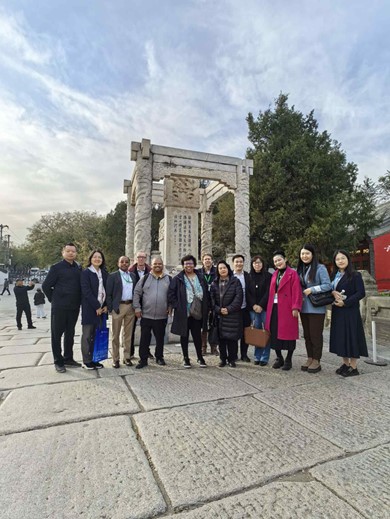2025 World Chinese Language Conference in Beijing
20 November 2025
On the 14th of November 2025 Dr Andrew M Law attended the 3rd (2025) World Chinese Language Conference in Beijing which was organised by the CIEC and CLEC. The conference which took place across the weekend ran from the 14th to the 16th of November and was attended by delegates, Confucius institute staff, academics and consultants from all around the world. On Friday morning, Dr Law managed to attend the opening ceremony and a series of other activities across the weekend which were extremely useful both academically and socially. The opening ceremony also included a speech from the Chinese government’s minister of education which set the scene for the conference and the activities that were to follow. Overall, while the conference explored many different pedagogical themes, some of the standout topics related to issues of AI and learning Chinese in relation to digital tools and practices.
Outside of these academic activities, the conference also included many social and cultural activities that allowed Confucius institute staff – including many Confucius Institute Directors – to meet and socialise. Several of these activities were organised by Xiamen University who is the leading partner behind several of the Confucius Institutes in the UK including Cardiff, Southampton and Newcastle University. On the Friday evening, Dr Law therefore attended a welcome banquet which was hosted by Xiamen University at the Beijing Xiamen Mansion Yihao Hotel. Then on Saturday the 15th along with other staff related to Xiamen University, Dr Law took a coach to the the Lugou Bridge History Museum in Beijing. The bridge, which was once admired by the thirteenth/fourteenth century Venetian traveller Marco Polo (1254-1324), was a positive reminder of the importance of western and eastern relations and the importance of future collaboration despite our differences (including our different cultures and politics); the bridge with its 501 stone lions was also admired by all the delegates who were particularly interested in the way gender operated as a marker of difference between the stone lions – the male lions often have a stone ball under their feet whereas the lionesses carry their cubs on their bodies or under their feet. Delegates also commented on the patriarchal aspect of these gendered statues showing that as scholars we have not forgotten to ask critical questions about past relics and heritage. After our examination of the Lions, the delegates took several group photos including the one below:
After our group photos, the delegates then went to the “China White Dehua Porcelain” Beijing Center; after a walk around the centre an excellent local tour guide Jing gave us a historical overview of the museum and the porcelain in the centre. Specifically, we learnt that the Porcelain represents some of the highest quality ceramic craftsmanship in China – the other major centre being Jingdezhen in eastern Jiangxi province. Then after this excellent tour we stopped for tea before going to dinner in the Lijia Courtyard Restaurant where we discussed future collaborations and further CI activities.
On Sunday the 16th Dr Law and various other delegates attended the closing ceremony of the Conference and particularly Andrew took the time to visit one of the breakout sessions where the previous Chinese Newcastle Director Professor Ruojuan Zheng was receiving an award. Dr Law was pleased to see Professor Zheng receive this award because she has continually been an excellent CI Director wherever she goes (she is currently in Stellenbosch in South Africa). Finally, in the afternoon, Professor Zheng treated Dr Law and her Stellenbosch colleagues to a lunch in the ‘old’ street at Qianmen before we all went back to our hotels to prepare for the homeward journey.
Overall, then, Dr Law understood that the 2025 World Chinese Language Conference is much more than an academic and/or a Confucius Institute conference; indeed, the conference is an important space by which the institute can continue to create bonds of trust and friendship between different delegates and directors from around the world. Thus, while many of the delegates came from different backgrounds and from different political systems, all in all, the delegates at the conference (including Dr Law) wanted to work together to establish stronger ties and networks. The 2025 World Chinese Language Conference is therefore ultimately a site of peace building and co-operation.
